Exploring Directors' Duties, Liabilities & the Corporation Act 2001
VerifiedAdded on 2023/06/13
|6
|1708
|464
Report
AI Summary
This report provides a detailed analysis of directors' duties and liabilities under the Corporation Act 2001. It examines key sections of the Act, including Section 180 (duty of care and diligence), Section 182 and 183 (use of information), and Section 191 (disclosure of interest). The report discusses the fiduciary duties of directors, including acting in good faith and for a proper purpose, with reference to relevant case law such as ASIC v Adler (2002) and Forty Two International Pty Limited v Barnes [2014]. It also addresses situations where directors may be personally liable for company debts, particularly in cases of insolvent trading, referencing Section 588H of the Act. The report aims to provide a comprehensive understanding of the legal obligations and potential liabilities faced by company directors under Australian corporate law.
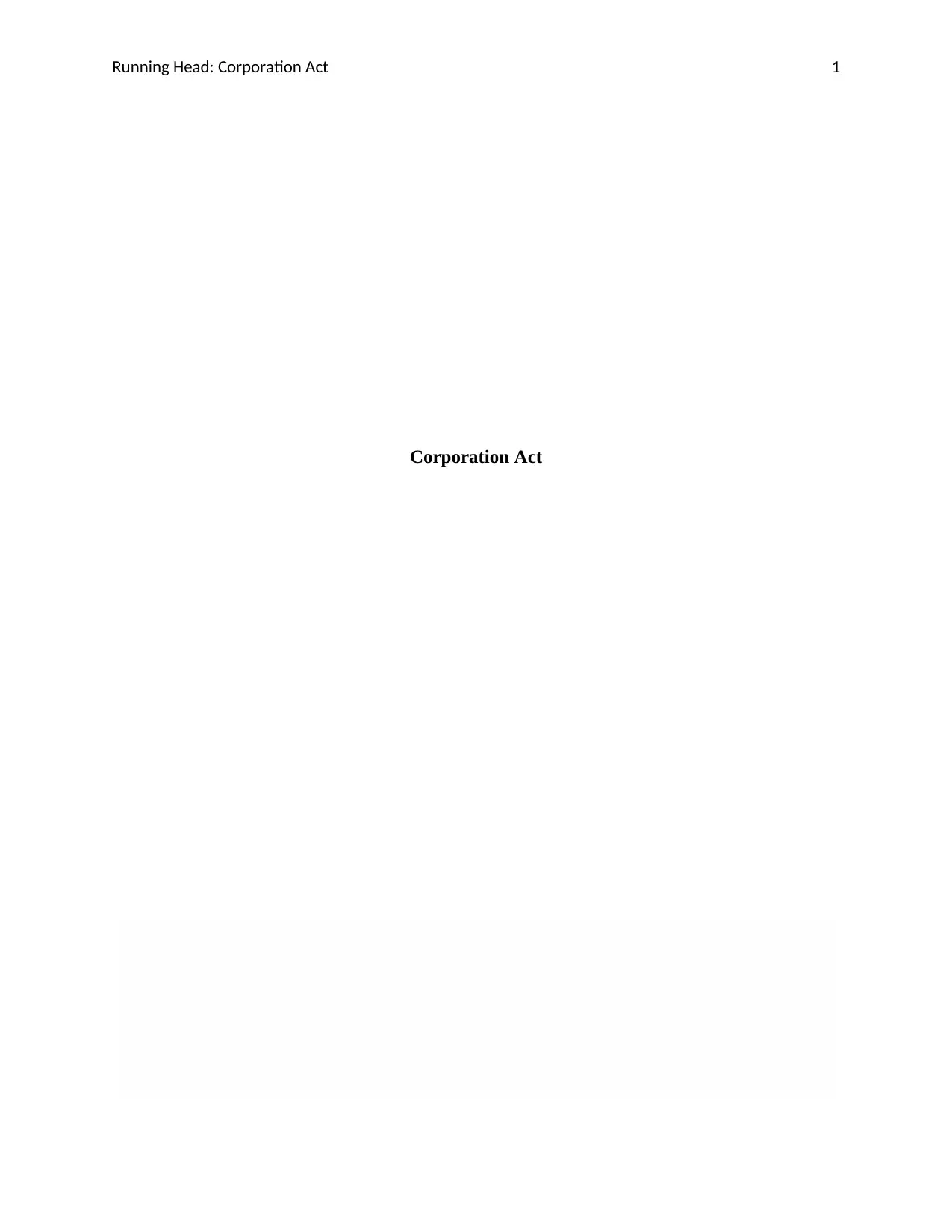
Running Head: Corporation Act 1
Corporation Act
Corporation Act
Paraphrase This Document
Need a fresh take? Get an instant paraphrase of this document with our AI Paraphraser
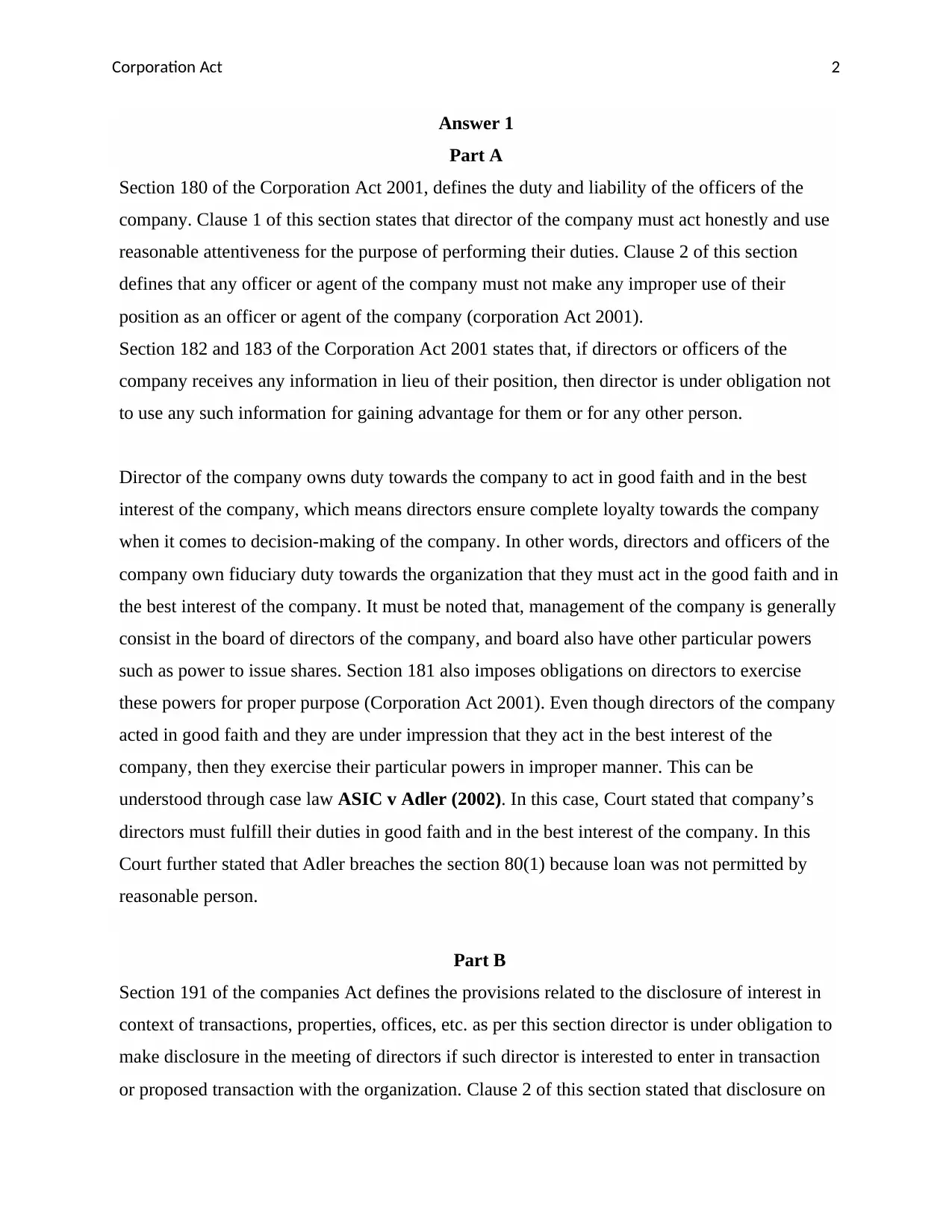
Corporation Act 2
Answer 1
Part A
Section 180 of the Corporation Act 2001, defines the duty and liability of the officers of the
company. Clause 1 of this section states that director of the company must act honestly and use
reasonable attentiveness for the purpose of performing their duties. Clause 2 of this section
defines that any officer or agent of the company must not make any improper use of their
position as an officer or agent of the company (corporation Act 2001).
Section 182 and 183 of the Corporation Act 2001 states that, if directors or officers of the
company receives any information in lieu of their position, then director is under obligation not
to use any such information for gaining advantage for them or for any other person.
Director of the company owns duty towards the company to act in good faith and in the best
interest of the company, which means directors ensure complete loyalty towards the company
when it comes to decision-making of the company. In other words, directors and officers of the
company own fiduciary duty towards the organization that they must act in the good faith and in
the best interest of the company. It must be noted that, management of the company is generally
consist in the board of directors of the company, and board also have other particular powers
such as power to issue shares. Section 181 also imposes obligations on directors to exercise
these powers for proper purpose (Corporation Act 2001). Even though directors of the company
acted in good faith and they are under impression that they act in the best interest of the
company, then they exercise their particular powers in improper manner. This can be
understood through case law ASIC v Adler (2002). In this case, Court stated that company’s
directors must fulfill their duties in good faith and in the best interest of the company. In this
Court further stated that Adler breaches the section 80(1) because loan was not permitted by
reasonable person.
Part B
Section 191 of the companies Act defines the provisions related to the disclosure of interest in
context of transactions, properties, offices, etc. as per this section director is under obligation to
make disclosure in the meeting of directors if such director is interested to enter in transaction
or proposed transaction with the organization. Clause 2 of this section stated that disclosure on
Answer 1
Part A
Section 180 of the Corporation Act 2001, defines the duty and liability of the officers of the
company. Clause 1 of this section states that director of the company must act honestly and use
reasonable attentiveness for the purpose of performing their duties. Clause 2 of this section
defines that any officer or agent of the company must not make any improper use of their
position as an officer or agent of the company (corporation Act 2001).
Section 182 and 183 of the Corporation Act 2001 states that, if directors or officers of the
company receives any information in lieu of their position, then director is under obligation not
to use any such information for gaining advantage for them or for any other person.
Director of the company owns duty towards the company to act in good faith and in the best
interest of the company, which means directors ensure complete loyalty towards the company
when it comes to decision-making of the company. In other words, directors and officers of the
company own fiduciary duty towards the organization that they must act in the good faith and in
the best interest of the company. It must be noted that, management of the company is generally
consist in the board of directors of the company, and board also have other particular powers
such as power to issue shares. Section 181 also imposes obligations on directors to exercise
these powers for proper purpose (Corporation Act 2001). Even though directors of the company
acted in good faith and they are under impression that they act in the best interest of the
company, then they exercise their particular powers in improper manner. This can be
understood through case law ASIC v Adler (2002). In this case, Court stated that company’s
directors must fulfill their duties in good faith and in the best interest of the company. In this
Court further stated that Adler breaches the section 80(1) because loan was not permitted by
reasonable person.
Part B
Section 191 of the companies Act defines the provisions related to the disclosure of interest in
context of transactions, properties, offices, etc. as per this section director is under obligation to
make disclosure in the meeting of directors if such director is interested to enter in transaction
or proposed transaction with the organization. Clause 2 of this section stated that disclosure on
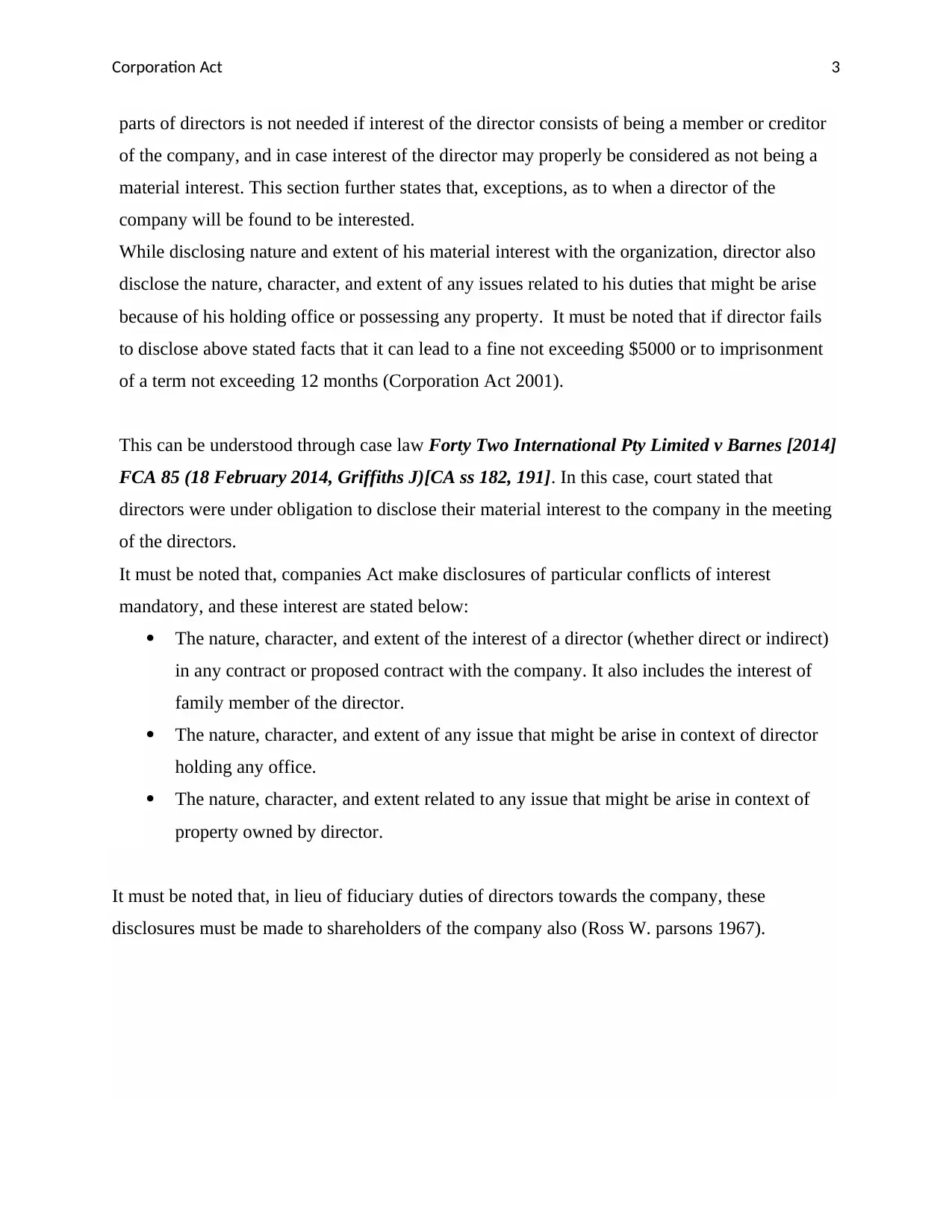
Corporation Act 3
parts of directors is not needed if interest of the director consists of being a member or creditor
of the company, and in case interest of the director may properly be considered as not being a
material interest. This section further states that, exceptions, as to when a director of the
company will be found to be interested.
While disclosing nature and extent of his material interest with the organization, director also
disclose the nature, character, and extent of any issues related to his duties that might be arise
because of his holding office or possessing any property. It must be noted that if director fails
to disclose above stated facts that it can lead to a fine not exceeding $5000 or to imprisonment
of a term not exceeding 12 months (Corporation Act 2001).
This can be understood through case law Forty Two International Pty Limited v Barnes [2014]
FCA 85 (18 February 2014, Griffiths J)[CA ss 182, 191]. In this case, court stated that
directors were under obligation to disclose their material interest to the company in the meeting
of the directors.
It must be noted that, companies Act make disclosures of particular conflicts of interest
mandatory, and these interest are stated below:
The nature, character, and extent of the interest of a director (whether direct or indirect)
in any contract or proposed contract with the company. It also includes the interest of
family member of the director.
The nature, character, and extent of any issue that might be arise in context of director
holding any office.
The nature, character, and extent related to any issue that might be arise in context of
property owned by director.
It must be noted that, in lieu of fiduciary duties of directors towards the company, these
disclosures must be made to shareholders of the company also (Ross W. parsons 1967).
parts of directors is not needed if interest of the director consists of being a member or creditor
of the company, and in case interest of the director may properly be considered as not being a
material interest. This section further states that, exceptions, as to when a director of the
company will be found to be interested.
While disclosing nature and extent of his material interest with the organization, director also
disclose the nature, character, and extent of any issues related to his duties that might be arise
because of his holding office or possessing any property. It must be noted that if director fails
to disclose above stated facts that it can lead to a fine not exceeding $5000 or to imprisonment
of a term not exceeding 12 months (Corporation Act 2001).
This can be understood through case law Forty Two International Pty Limited v Barnes [2014]
FCA 85 (18 February 2014, Griffiths J)[CA ss 182, 191]. In this case, court stated that
directors were under obligation to disclose their material interest to the company in the meeting
of the directors.
It must be noted that, companies Act make disclosures of particular conflicts of interest
mandatory, and these interest are stated below:
The nature, character, and extent of the interest of a director (whether direct or indirect)
in any contract or proposed contract with the company. It also includes the interest of
family member of the director.
The nature, character, and extent of any issue that might be arise in context of director
holding any office.
The nature, character, and extent related to any issue that might be arise in context of
property owned by director.
It must be noted that, in lieu of fiduciary duties of directors towards the company, these
disclosures must be made to shareholders of the company also (Ross W. parsons 1967).
⊘ This is a preview!⊘
Do you want full access?
Subscribe today to unlock all pages.

Trusted by 1+ million students worldwide
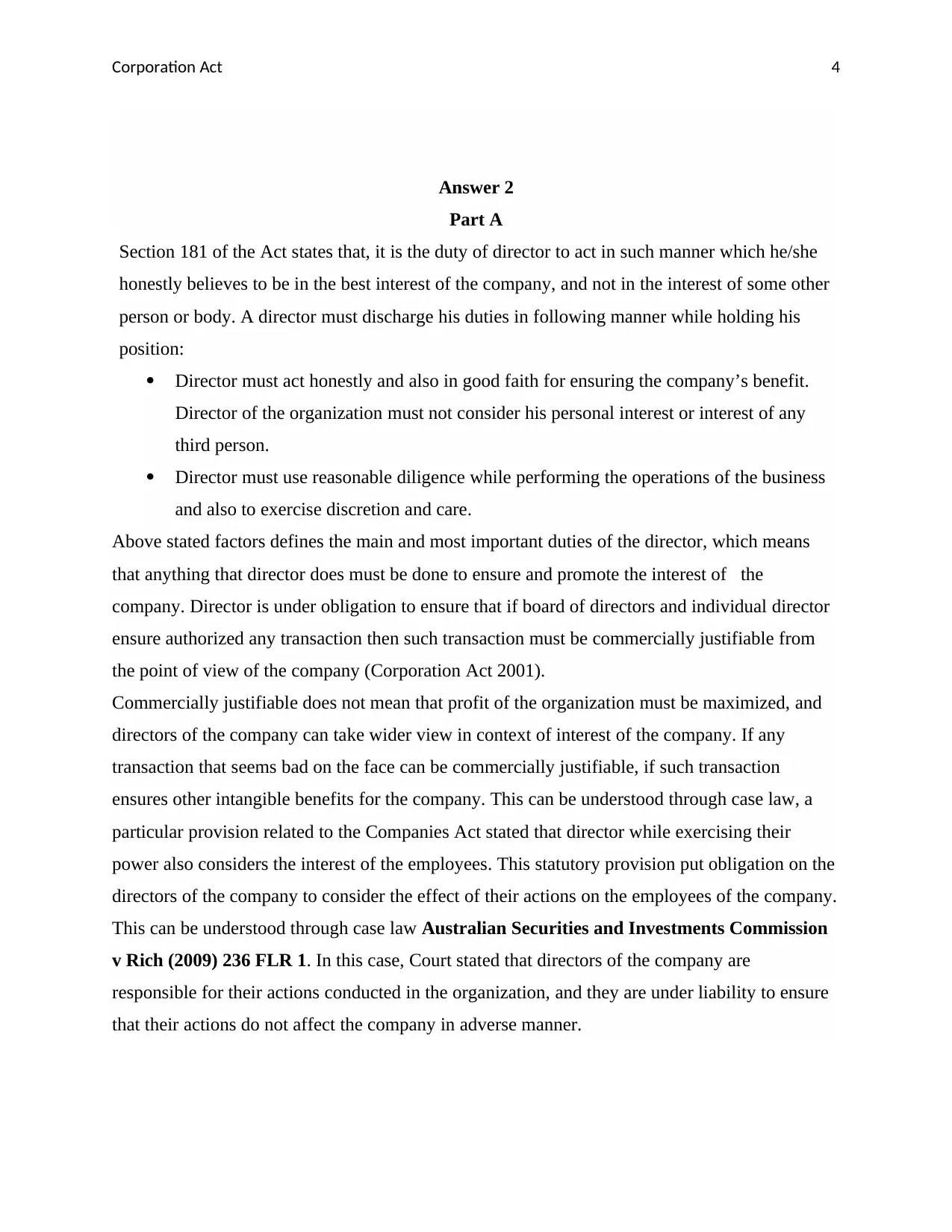
Corporation Act 4
Answer 2
Part A
Section 181 of the Act states that, it is the duty of director to act in such manner which he/she
honestly believes to be in the best interest of the company, and not in the interest of some other
person or body. A director must discharge his duties in following manner while holding his
position:
Director must act honestly and also in good faith for ensuring the company’s benefit.
Director of the organization must not consider his personal interest or interest of any
third person.
Director must use reasonable diligence while performing the operations of the business
and also to exercise discretion and care.
Above stated factors defines the main and most important duties of the director, which means
that anything that director does must be done to ensure and promote the interest of the
company. Director is under obligation to ensure that if board of directors and individual director
ensure authorized any transaction then such transaction must be commercially justifiable from
the point of view of the company (Corporation Act 2001).
Commercially justifiable does not mean that profit of the organization must be maximized, and
directors of the company can take wider view in context of interest of the company. If any
transaction that seems bad on the face can be commercially justifiable, if such transaction
ensures other intangible benefits for the company. This can be understood through case law, a
particular provision related to the Companies Act stated that director while exercising their
power also considers the interest of the employees. This statutory provision put obligation on the
directors of the company to consider the effect of their actions on the employees of the company.
This can be understood through case law Australian Securities and Investments Commission
v Rich (2009) 236 FLR 1. In this case, Court stated that directors of the company are
responsible for their actions conducted in the organization, and they are under liability to ensure
that their actions do not affect the company in adverse manner.
Answer 2
Part A
Section 181 of the Act states that, it is the duty of director to act in such manner which he/she
honestly believes to be in the best interest of the company, and not in the interest of some other
person or body. A director must discharge his duties in following manner while holding his
position:
Director must act honestly and also in good faith for ensuring the company’s benefit.
Director of the organization must not consider his personal interest or interest of any
third person.
Director must use reasonable diligence while performing the operations of the business
and also to exercise discretion and care.
Above stated factors defines the main and most important duties of the director, which means
that anything that director does must be done to ensure and promote the interest of the
company. Director is under obligation to ensure that if board of directors and individual director
ensure authorized any transaction then such transaction must be commercially justifiable from
the point of view of the company (Corporation Act 2001).
Commercially justifiable does not mean that profit of the organization must be maximized, and
directors of the company can take wider view in context of interest of the company. If any
transaction that seems bad on the face can be commercially justifiable, if such transaction
ensures other intangible benefits for the company. This can be understood through case law, a
particular provision related to the Companies Act stated that director while exercising their
power also considers the interest of the employees. This statutory provision put obligation on the
directors of the company to consider the effect of their actions on the employees of the company.
This can be understood through case law Australian Securities and Investments Commission
v Rich (2009) 236 FLR 1. In this case, Court stated that directors of the company are
responsible for their actions conducted in the organization, and they are under liability to ensure
that their actions do not affect the company in adverse manner.
Paraphrase This Document
Need a fresh take? Get an instant paraphrase of this document with our AI Paraphraser
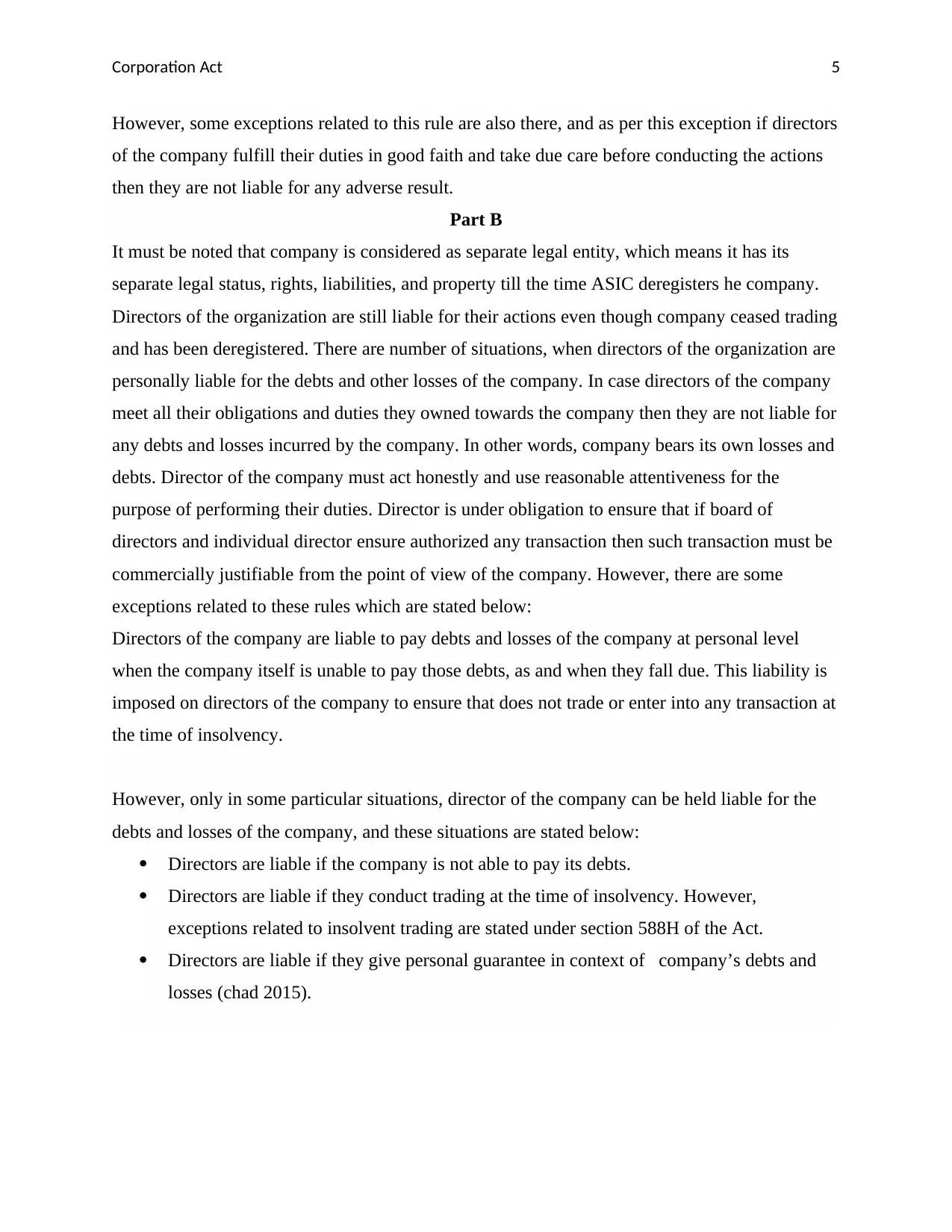
Corporation Act 5
However, some exceptions related to this rule are also there, and as per this exception if directors
of the company fulfill their duties in good faith and take due care before conducting the actions
then they are not liable for any adverse result.
Part B
It must be noted that company is considered as separate legal entity, which means it has its
separate legal status, rights, liabilities, and property till the time ASIC deregisters he company.
Directors of the organization are still liable for their actions even though company ceased trading
and has been deregistered. There are number of situations, when directors of the organization are
personally liable for the debts and other losses of the company. In case directors of the company
meet all their obligations and duties they owned towards the company then they are not liable for
any debts and losses incurred by the company. In other words, company bears its own losses and
debts. Director of the company must act honestly and use reasonable attentiveness for the
purpose of performing their duties. Director is under obligation to ensure that if board of
directors and individual director ensure authorized any transaction then such transaction must be
commercially justifiable from the point of view of the company. However, there are some
exceptions related to these rules which are stated below:
Directors of the company are liable to pay debts and losses of the company at personal level
when the company itself is unable to pay those debts, as and when they fall due. This liability is
imposed on directors of the company to ensure that does not trade or enter into any transaction at
the time of insolvency.
However, only in some particular situations, director of the company can be held liable for the
debts and losses of the company, and these situations are stated below:
Directors are liable if the company is not able to pay its debts.
Directors are liable if they conduct trading at the time of insolvency. However,
exceptions related to insolvent trading are stated under section 588H of the Act.
Directors are liable if they give personal guarantee in context of company’s debts and
losses (chad 2015).
However, some exceptions related to this rule are also there, and as per this exception if directors
of the company fulfill their duties in good faith and take due care before conducting the actions
then they are not liable for any adverse result.
Part B
It must be noted that company is considered as separate legal entity, which means it has its
separate legal status, rights, liabilities, and property till the time ASIC deregisters he company.
Directors of the organization are still liable for their actions even though company ceased trading
and has been deregistered. There are number of situations, when directors of the organization are
personally liable for the debts and other losses of the company. In case directors of the company
meet all their obligations and duties they owned towards the company then they are not liable for
any debts and losses incurred by the company. In other words, company bears its own losses and
debts. Director of the company must act honestly and use reasonable attentiveness for the
purpose of performing their duties. Director is under obligation to ensure that if board of
directors and individual director ensure authorized any transaction then such transaction must be
commercially justifiable from the point of view of the company. However, there are some
exceptions related to these rules which are stated below:
Directors of the company are liable to pay debts and losses of the company at personal level
when the company itself is unable to pay those debts, as and when they fall due. This liability is
imposed on directors of the company to ensure that does not trade or enter into any transaction at
the time of insolvency.
However, only in some particular situations, director of the company can be held liable for the
debts and losses of the company, and these situations are stated below:
Directors are liable if the company is not able to pay its debts.
Directors are liable if they conduct trading at the time of insolvency. However,
exceptions related to insolvent trading are stated under section 588H of the Act.
Directors are liable if they give personal guarantee in context of company’s debts and
losses (chad 2015).
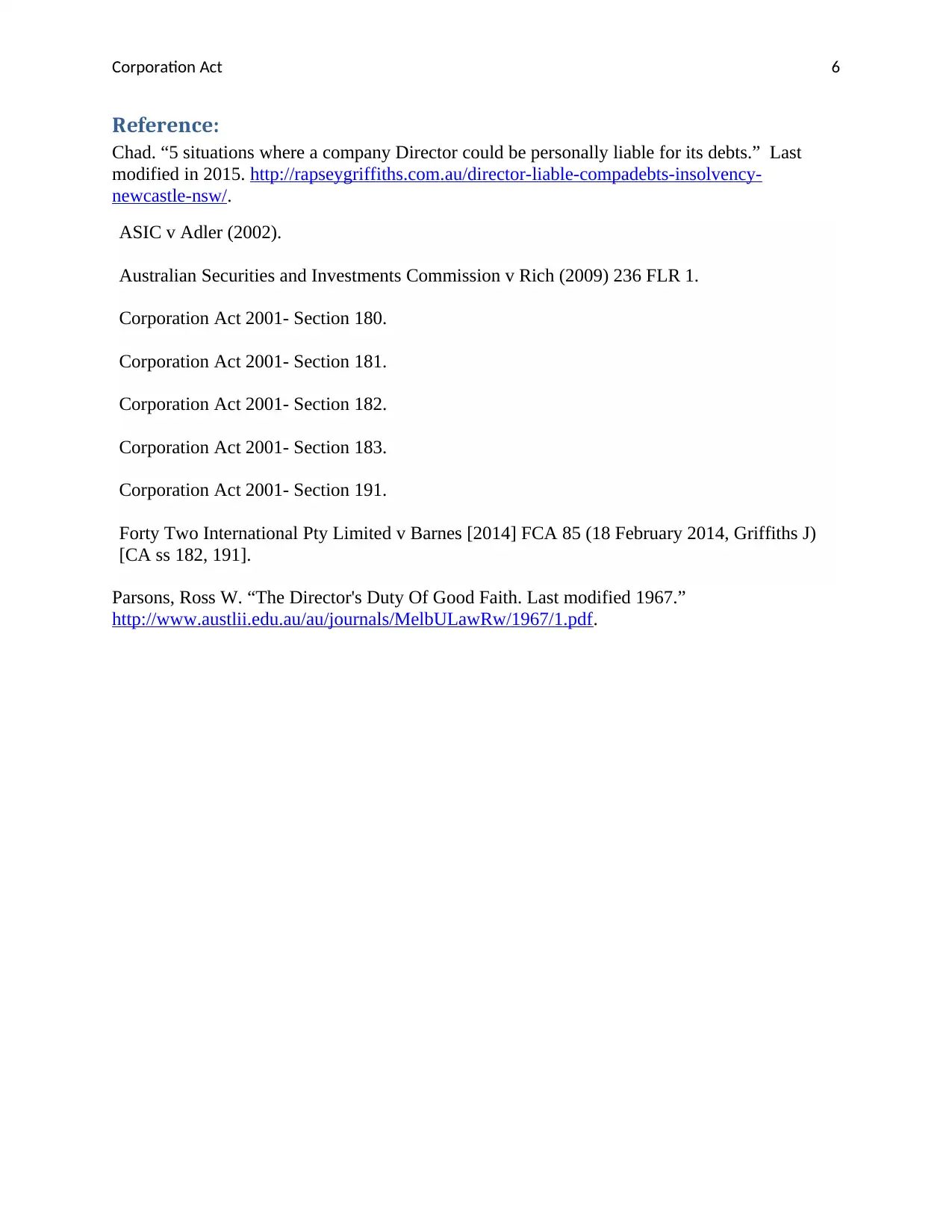
Corporation Act 6
Reference:
Chad. “5 situations where a company Director could be personally liable for its debts.” Last
modified in 2015. http://rapseygriffiths.com.au/director-liable-compadebts-insolvency-
newcastle-nsw/.
ASIC v Adler (2002).
Australian Securities and Investments Commission v Rich (2009) 236 FLR 1.
Corporation Act 2001- Section 180.
Corporation Act 2001- Section 181.
Corporation Act 2001- Section 182.
Corporation Act 2001- Section 183.
Corporation Act 2001- Section 191.
Forty Two International Pty Limited v Barnes [2014] FCA 85 (18 February 2014, Griffiths J)
[CA ss 182, 191].
Parsons, Ross W. “The Director's Duty Of Good Faith. Last modified 1967.”
http://www.austlii.edu.au/au/journals/MelbULawRw/1967/1.pdf.
Reference:
Chad. “5 situations where a company Director could be personally liable for its debts.” Last
modified in 2015. http://rapseygriffiths.com.au/director-liable-compadebts-insolvency-
newcastle-nsw/.
ASIC v Adler (2002).
Australian Securities and Investments Commission v Rich (2009) 236 FLR 1.
Corporation Act 2001- Section 180.
Corporation Act 2001- Section 181.
Corporation Act 2001- Section 182.
Corporation Act 2001- Section 183.
Corporation Act 2001- Section 191.
Forty Two International Pty Limited v Barnes [2014] FCA 85 (18 February 2014, Griffiths J)
[CA ss 182, 191].
Parsons, Ross W. “The Director's Duty Of Good Faith. Last modified 1967.”
http://www.austlii.edu.au/au/journals/MelbULawRw/1967/1.pdf.
⊘ This is a preview!⊘
Do you want full access?
Subscribe today to unlock all pages.

Trusted by 1+ million students worldwide
1 out of 6
Related Documents
Your All-in-One AI-Powered Toolkit for Academic Success.
+13062052269
info@desklib.com
Available 24*7 on WhatsApp / Email
![[object Object]](/_next/static/media/star-bottom.7253800d.svg)
Unlock your academic potential
Copyright © 2020–2026 A2Z Services. All Rights Reserved. Developed and managed by ZUCOL.





